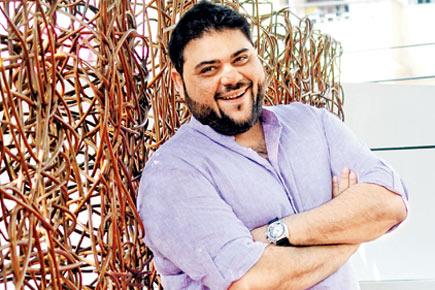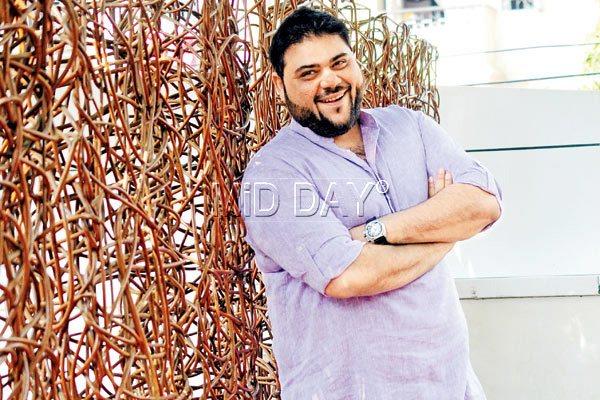Riyaaz Amlani, who owns some of Mumbai’s most upmarket, creative spaces and restaurants today tells Kareena Gianani about being painfully shy as a kid, and perceptive, and how the mix got him where he is today

Riyaaz Amlani
Riyaaz Amlani, CEO and MD, Impresario Entertainment and Hospitality Pvt Ltd
As a junior college student at Churchgate's HR College, Riyaaz Amlani, the quintessential Byculla boy, who moonlighted as a DJ at Parsi weddings, showed some serious jive moves and was secretly conscious of his weight, began dating an "uptown girl". Suddenly, the city that the affable, bookish teenager knew so intimately seemed hostile to his one ardent wish — the lovers had nowhere to go. Sure, he knew his way around then Bombay's bylanes, that one restaurant which had a corner table, that nook which gave couples stolen moments of privacy. But Amlani wanted to woo, he wanted to be entertained and engaged as he discovered love, and the city just didn't live up.

"I was disappointed and decided to, someday, build something affordable and accessible for youngsters. At the same time, I was obsessed with the idea of Quahveh Khanneh (coffee houses that offer hookahs, too) of Morocco and Turkey," he remembers. That is how Mumbai saw one of its first coffee houses, Mocha, which opened doors at Churchgate in 2001, outside Berry's, the restaurant owned by Amlani's father. The restaurateur remembers how the elderly, loyal patrons of the latter curiously looked around Mocha's flamboyant Indo-Tibetan-themed interiors before walking in.
Today, Amlani's Impresario Entertainment and Hospitality Pvt Ltd includes café's, restaurants and spaces with edgy design and experiential dining. Smoke House Deli, Salt Water Grill, Prithvi Café and Mocha Arthouse have proven to be chic, innovative answers to the curious Mumbai diner.
Root of the matter
"Contrary to having opened all these restaurants — and my size — I am not a foodie," chuckles Amlani as we settle in amid a moderately busy afternoon at Bandra's Salt Water Café. "I am not a fussy eater. I love home-cooked food and was one of those children whose mothers did not tolerate them making faces at food they didn't like," he says.
He reminisces about his childhood, which he says was humble, rugged and as adventurous as it could get for a boy growing up in Byculla. "My mother is Parsi, and I lived with her and my maternal grandmother at Lamington Road's Navjivan Society till I was nine years old," says the entrepreneur. We discuss parking woes at Navjivan, how its residents now wade through the sea of gleaming metal; cars parked in three rows along the narrowest of spaces, and its overall disarray. "It wasn't half as bad back then. Few people owned cars, and we, the young boys of the colony, played cricket at any spot we picked for the day. I didn't know kids couldn't do that at Navjivan anymore. It is all too structured," rues Amlani.
He may not be a foodie, but food does crop up frequently when he speaks of life at Byculla. Instead of being sheltered by Navjivan's highrises, Amlani began roaming the streets as his new friends gorged on Piyari Chaat and Kaleji. He remembers frequenting Bohri mohallas and his friends' homes and eating out of the thaal. "Something sweet, then something savoury, that's the order they followed, and I loved the communal feel of the meal, everybody sitting cross-legged on the floor, sharing food," says the 40-year-old.
Amlani's childhood was influenced more by his Parsi mother than his Muslim father. To him, his father's restaurant, Berry's at Churchgate, had a Hard Rock Café-like feel with its live jazz bands and excellent Chicken Stroganoff and Butter Chicken. "But till date, there are few things I relish as much as my mother's Dhana Dal and Dhansak, the Kolmi and the Patio. Parsi wedding feasts are memorable, and I used to be the DJ at Parsi and Catholic weddings. I knew the old-fashioned jive, and knew how to make the guests have a good time, unfailingly," he smiles.
Amlani, self-admittedly, was that boy who took other shy kids under his wing and ensured they settled in just fine. "I did that because I was painfully shy and conscious of my weight, so I compensated for those feelings. I read widely, finished two Enid Blytons a day, which made me articulate and feel better about things in general. I was naturally talented and surprised myself by earning a black belt in karate," he says unabashedly.
Amlani believes the man he is today —enterprising and relentlessly curious — has everything to do with his humble beginnings and the fact that he began working for Metro shoes at Colaba at the young age of 13 for pocket money. "I was a good salesman," he smiles. "And I got to understand customer mentality up close," he says. By the time he reached college, he opened a show shop at Sion circle, called Show Wagon. "'Shoes That Take You Places' was the tagline," he grins.
Another Rubicon of sorts for the businessman, which divided his carefree life into a Before and After, was being part of the tony crowd of HR College. "Think about it — I was a rough, smart-alecy, Byculla kid. I fit in easily with the SoBo crowd because I was the affable, gregarious sort, but I soon noticed how my other friends were sidelined by the same people. We were always the 'vernies' to them – I had never even heard of the term before, and it irked me," he recalls. Amlani says he was shocked at the equity placed at where you came from. "But it also stoked me, I had some rage issues back then, but they soon morphed into ambition. I developed this need to prove myself. I don't mean to say I would not have done this," he says, and outstretches his arms around at his restaurant, "but I would have probably opened 13 shoe shops."
After college, fired by the idea of changing Mumbai's entertainment scene and introducing the coffee culture, Amlani went on to study Entertainment Management at University of California, Los Angeles (UCLA), worked multiple shifts at coffee shops and flipped burgers to fund his tuition. After returning to India in 1998, he consulted for the Hiranandani Group and the result was Hakone. After that, Amlani designed several pool parlours (a rage in the '90s), go-karting venues and gyms.
As soon as the idea for what would be Mocha developed in Amlani's mind, he knew it would not be a "copy-paste" Starbucks. "Bombay already had one Barista at Chowpatty, and I wanted to innovate further," he elaborates.
Today is the new tomorrow
Today, is an imagery that spurs Amlani to establish a new café or restaurant. "I know it sounds crazy, because, hey, I open restaurants — but it isn't food that excites me, it is always something I might have seen, a place that enraptured me, an idea I cannot get out of my head that I want to translate into a physical space. For instance, I wanted to come up with Salt Water Grill simply because I was having a graphic novels phase. Del Italia exists today because I was in love with an Italian girl," he winks. "I simply find ways to monetise my creativity," says Amlani — a fair point in the times of private equity having entered the Indian food industry like never before.
The restaurateur says his leadership style is one, which discourages "an assembly-line attitude". "As somebody who wants to be in the top three food companies in the country, and only dreams of a Michelin star, I try to give my employees goals, sure, but with a definite philosophy imprinted on them — the spaces we build have to be evocative enough to inspire moods," he explains.
Evidently, Amlani's personal life influences his work, and it isn't something he dislikes. "I love to read, I adore music and photography, and I feel marriage has been one of the biggest changes in my life," he smiles. Amlani and his wife, Kiran, had a baby boy, Khayal, three months ago. "Having a family realigns your ambition, your end goals. Mine, now, are forever entwined with theirs," concludes Amlani.
 Subscribe today by clicking the link and stay updated with the latest news!" Click here!
Subscribe today by clicking the link and stay updated with the latest news!" Click here!







